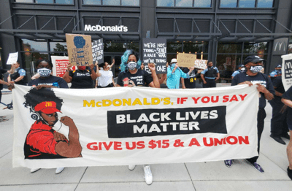by: Whitney Shervey

Positionality
As a white cisgender queer woman who has worked in the food industry for 20 years, I have experienced first-hand inequities at the intersection of gender and class and witnessed and been complicit to systemic racism. My complicity in white supremacy stems from whiteness and without being constantly challenged will further systemic racism. I encourage other white folks in the restaurant industry and beyond to learn how their whiteness makes them complicit in a system that is killing people.
Restaurant Industry and COVID-19
The restaurant industry has been hit hard by COVID-19 and the people who have been impacted the most severely are the workers. Across the US, restaurants have been forced to close their doors, lay off workers, and pivot their operations to abide by rules and regulations to limit the spread of COVID-19, yet fast-food restaurants have remained steadily open.
Systemic Racism and Fast-Food
The current Black Lives Matter uprising that is sweeping across the country and around the world is not only a call to abolish the police, but is also a call to address the systemic racism that has forever plagued America. Systemic racism is why so many people of color work in fast food with the lowest of the low wages, little job mobility, and little to no benefits. Systemic racism and COVID-19 are plaguing workers of color in an industry that is already known for its egregious labor violations.
Women of Color Fast-Food Workers
The fast-food sector of the restaurant industry is the lowest paying and even before COVID-19 had a low standard of safety protection for its workers. Women of color are disproportionately represented in low-wage work like fast-food and are often segregated into the lowest paying positions. This leaves women of color that work in fast-food no choice but to risk their lives to feed their own families. This is systemic racism at play and leaves me to wonder what, if anything at all, fast food corporations are doing about it?
Fast-Food Corporations

Following the days after George Floyd’s death, fast food corporations like McDonald’s, Burger King, Wendy’s, and the Pacific Northwest Burgerville fast-food chain made statements on how they are committed to addressing racism. All of these corporations have been challenged by their workers to address the inequities of systemic racism by worker-led direct action in the past and for the most part, have failed.
Holding Corporations Accountable
Fast-food workers know their struggle and have been fighting to challenge fast-food corporations through worker-led movements like Fight for $15 and attempts to unionize for years. Knowing their anti-worker history, fast-food corporations announcing their support for the current uprising is concerning. If fast food corporations do not support those who are leading movements within their own companies to address the inequities they are experiencing, how can we trust that their commitments to addressing inequity will be met? Who will hold them accountable?
Building and Supporting Worker Power
In response to corporations making these claims but not responding to the needs of essential fast-food workers, fast-food work stoppages across the nation are taking place in support for the Strike For Black Lives. Since the historical unionizing of fast-food workers at Burgerville in my hometown of Portland, Oregon in 2018, other food workers have been organizing and unionizing. This precedent has given restaurant workers actionable ways to address inequities in the workplace by using their worker power. During the pandemic, workers are using their power to challenge inadequate responses to address COVID-19 by their employers. Unionized fast-food workers have the leverage to challenge workplace safety during COVID-19, yet their ability to hold their employers accountable when they are making sweeping claims to address systemic racism needs the support of their customer base.
Black Lives Matter

While recently attending a Black Lives Matter protest that was being held outside of a McDonald’s in the neighborhood that I grew up in, I reflected on the importance of customer input when viewing the never-ending line in the drive-through. In the wake of COVID-19, more than ever convenience has become a priority for American eaters. This convenience is made possible by systemic racism that disproportionately impacts women of color. Whether you are relying on fast-food workers to keep you fed or are protesting in their parking lots I urge to look beyond the statements coming from the top and find solidarity in worker-led movements
Who do you Support?
Fast-food chains already have a platform and do not need their voices amplified. So, the next time you see them making claims on their social media platforms think twice before pressing the like. My task is to ask all of you to take it upon yourself to know what workers are already doing to address inequity in their workplace. I ask you to trust the experiences of the workers and hold corporations accountable when they are making sweeping claims of how they plan to address racism.
What is Solidarity?
I also ask you to reflect on what solidarity means to you. To me, solidarity means showing up knowing that the struggle of the folks you are showing up for is your struggle. It is the role of white people to figure out how your struggle intersects with Black Lives Matter and to show up. It is the role of fast-food eaters to figure out how your struggle intersects with fast-food workers and show up.
Please, show up!
Sources:
Brusky, Joe. (Artist) (2020). Chicago McDonald’s Workers on Strike. Retrieved July 24, 2020, from https://www.flickr.com/photos/40969298@N05/50025996817/
Tyler, Keith. (Artist) (2007). Painted Symbol of the Power Fist. Retrieved June 17, 2020, from https://en.wikipedia.org/wiki/Raised_fist#/media/File:Fist.svg
 Whitney Shervey is a professional cook from Portland, OR where she has worked in food work for 20 years. She is a recent graduate of the M.S. in Food Systems and Society program at OHSU where she focused her research on the role unions and worker centers play in restaurant industry equality. After years of working in the restaurant industry, she is committed to using labor organizing to transform the food industry to be more equitable.
Whitney Shervey is a professional cook from Portland, OR where she has worked in food work for 20 years. She is a recent graduate of the M.S. in Food Systems and Society program at OHSU where she focused her research on the role unions and worker centers play in restaurant industry equality. After years of working in the restaurant industry, she is committed to using labor organizing to transform the food industry to be more equitable.
